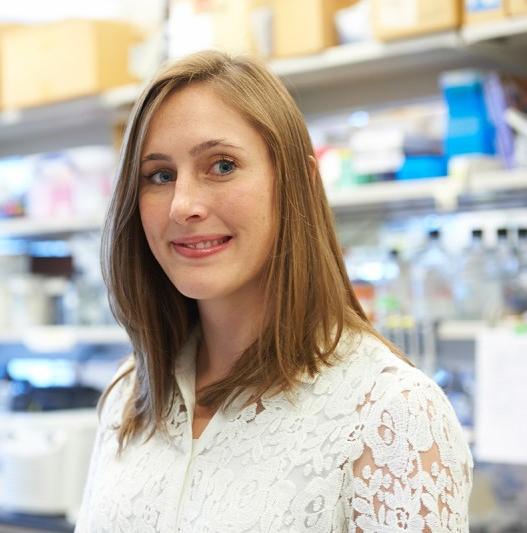Ashley Laughney, Ph.D., a former CSBC junior investigator at Memorial Sloan Kettering Cancer Center (MSKCC), trained in engineering, which she describes as “the art of problem-solving.”
As a graduate student at Dartmouth, she developed spectral imaging methods to identify margins of tumors during surgical procedures. However, during this time, Ashley focused on the design and characterization of technological platforms rather than the pathogenesis of cancer.
Her exposure to basic cancer research occurred during her first postdoctoral fellowship at Massachusetts General Hospital. Using imaging technologies to study chemotherapeutic resistance, she became interested in research at the interface of computation and cancer biology.
Now, Ashley uses her engineering background, such as hardware development and the analysis of big data, to solve complex research questions about cancer metastasis.
In this interview, she discusses her career path, the importance of both mentors and trainees in the cancer systems biology field, and her research investigating the role of immune cells in lung cancer.
Can you describe your transition to cancer systems biology?
I’m still learning in this field. I surround myself with experts in engineering, cancer research, and systems biology. Before I bridged engineering and biology, I focused on one element or the other at different stages.
For example, I learned about mouse models of cancer from hands-on experience before I was ready to apply systems biology approaches to my in vivo studies.
Along with training in the technical aspects of cancer biology, I also had to learn how to think about a research problem and experimental design.
How have mentors helped you during your career journey?
Mentors have been extremely influential and important on this journey. Behind every good scientist, there are good mentors. Ralph Weissleder taught me how to think about and test important research hypotheses. Joan Massagué and Dana Pe’er taught me how to look, in an unbiased way, at heterogenous and complex data sets. My graduate school advisors trained me to think for myself and develop experimental systems.
Good mentors are the key to success in science. It can’t be overstated enough.
How do you think trainees and junior investigators will advance the cancer systems biology field?
Collaborations in this interdisciplinary field are often initiated by talented graduate students and post-docs. They form a bridge between faculty members across disciplines. Although principal investigators bring their expertise to a team project, it sometimes takes trainees and junior investigators to fully integrate across and establish communication between different laboratories.
What advice would you give to trainees and junior investigators in cancer systems biology?
It takes dedication and time to learn aspects of multiple disciplines integrated across cancer systems biology. Also, don’t be shy. You need to ask questions to learn and progress in this field. There are a lot of important things to get done in this space and I think it’s a very rewarding research path.
What cancer systems biology approaches do you use in your research?
I predominantly use single-cell RNA sequencing to profile the heterogeneity of cells in patient tumor samples and mouse models of cancer. In my Ph.D. work, I studied spatial information related to tumors.
I think the next step for single-cell technologies will be to add back spatial context about the cellular diversity of cancer.
Can you describe your findings related to the role of immune cells, specifically Natural Killer (NK) cells, in lung cancer metastasis?
In primary tumors from lung cancer patients, where we saw the greatest cellular diversity, there was an exclusion of NK cells. Similarly, data from mouse models of delayed or indolent tumors showed that NK cells keep cancer growth in check. When we deplete NK cells from in vivo cancer models, we get overt metastasis. This led us to investigate the influence of NK cells on cancer heterogeneity.
Evidence from our experiments suggests that NK cells prune back certain stem-like cell lineages in the lung that promote tumor metastasis. In the absence of NK cells, the stem-like cells co-opt developmental pathways involved in lung regeneration to generate diverse progeny with metastatic capabilities.
How will your CSBC-supported research ultimately help patients?
By understanding the biology of micro-metastatic disease, specifically growth permissive conditions for metastatic cancer cells, we can therapeutically target specific tumor cells before metastasis occurs. The studies will also help us predict what tumors will metastasize, so clinicians can monitor patients to detect metastatic lesions at an earlier stage.
